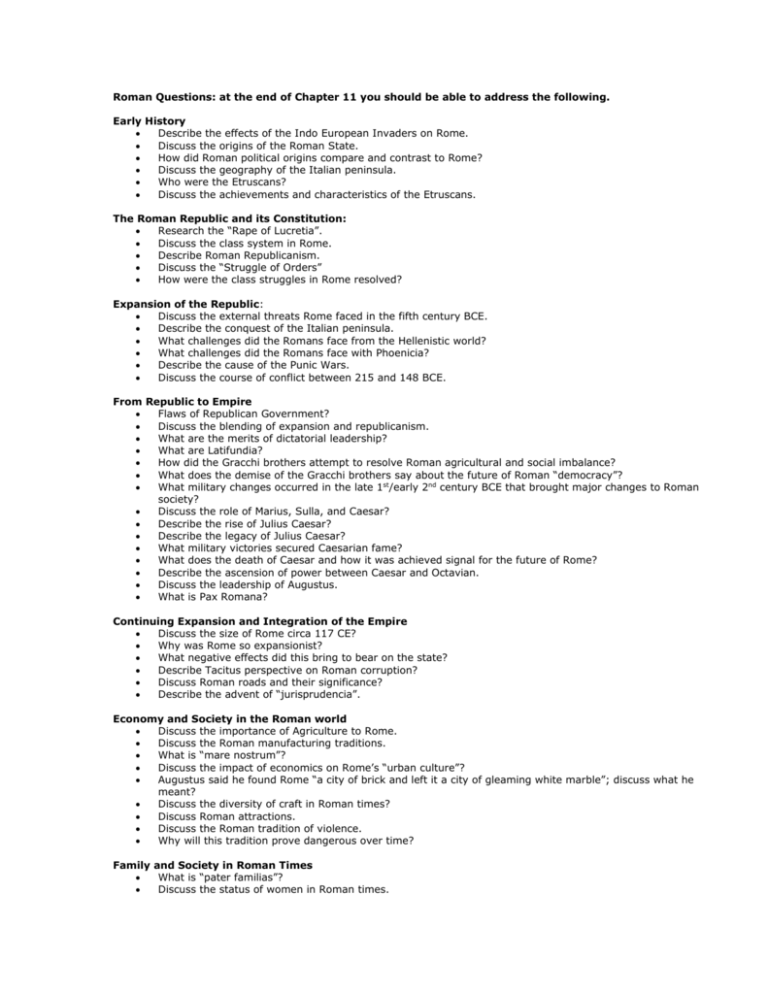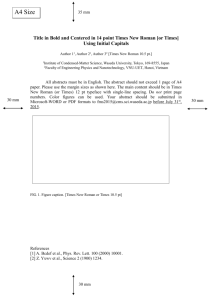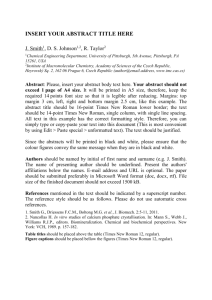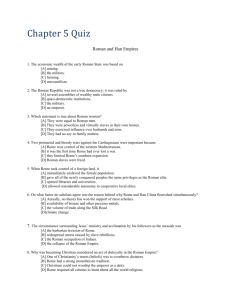romsilkdisques
advertisement

Roman Questions: at the end of Chapter 11 you should be able to address the following. Early History Describe the effects of the Indo European Invaders on Rome. Discuss the origins of the Roman State. How did Roman political origins compare and contrast to Rome? Discuss the geography of the Italian peninsula. Who were the Etruscans? Discuss the achievements and characteristics of the Etruscans. The Roman Republic and its Constitution: Research the “Rape of Lucretia”. Discuss the class system in Rome. Describe Roman Republicanism. Discuss the “Struggle of Orders” How were the class struggles in Rome resolved? Expansion of the Republic: Discuss the external threats Rome faced in the fifth century BCE. Describe the conquest of the Italian peninsula. What challenges did the Romans face from the Hellenistic world? What challenges did the Romans face with Phoenicia? Describe the cause of the Punic Wars. Discuss the course of conflict between 215 and 148 BCE. From Republic to Empire Flaws of Republican Government? Discuss the blending of expansion and republicanism. What are the merits of dictatorial leadership? What are Latifundia? How did the Gracchi brothers attempt to resolve Roman agricultural and social imbalance? What does the demise of the Gracchi brothers say about the future of Roman “democracy”? What military changes occurred in the late 1st/early 2nd century BCE that brought major changes to Roman society? Discuss the role of Marius, Sulla, and Caesar? Describe the rise of Julius Caesar? Describe the legacy of Julius Caesar? What military victories secured Caesarian fame? What does the death of Caesar and how it was achieved signal for the future of Rome? Describe the ascension of power between Caesar and Octavian. Discuss the leadership of Augustus. What is Pax Romana? Continuing Expansion and Integration of the Empire Discuss the size of Rome circa 117 CE? Why was Rome so expansionist? What negative effects did this bring to bear on the state? Describe Tacitus perspective on Roman corruption? Discuss Roman roads and their significance? Describe the advent of “jurisprudencia”. Economy and Society in the Roman world Discuss the importance of Agriculture to Rome. Discuss the Roman manufacturing traditions. What is “mare nostrum”? Discuss the impact of economics on Rome’s “urban culture”? Augustus said he found Rome “a city of brick and left it a city of gleaming white marble”; discuss what he meant? Discuss the diversity of craft in Roman times? Discuss Roman attractions. Discuss the Roman tradition of violence. Why will this tradition prove dangerous over time? Family and Society in Roman Times What is “pater familias”? Discuss the status of women in Roman times. What social changes came with the expanding wealth of the society? Discuss “Roman cuisine”…wow. What are “bread and circuses”? How were roman people appeased? Discuss the role of slaves in Rome? What happened in 73 BCE? The Cosmopolitan Mediterranean Discuss Roman attitudes towards conquered peoples religions. Discuss the similarities between Roman and Greek gods, as well as the differences. Discuss the appeal of Stoicism to the Romans. What were the religions of Salvations and why were they appealing? What is Mithraism? Why was this faith so appealing? Discuss the attitudes of the Jewish community towards the Roman political dominance? Who are the “Essenes”, “Zealots”, and “Messiac” Jews? Why were the Jews not the most accepting culture to Roman dominance? Describe the rise of Jesus of Nazareth. What is the problem of the “Historical Jesus”? What were Jesus’ moral and ethical teachings? Why was Jesus perceived by certain leaders to be a threat to the Hebrew establishment and the Roman Empire? Describe the role and impact of Paul of Tarsus and Peter. How did Roman leadership facilitate and foster Christian growth? What is the “New Testament”? Describe the growth of the Christianity. What is an “Ecclesia”? Describe the appeal of Christendom. Cross Cultural Exchanges on the Silk Road: at the conclusion of chapter 12 you should be able to address the following: Long Distance Trade and the Silk Road Networks: Why was trade in the Ancient world a risky proposition? Describe the challenges to building a multilateral system of trading? Why was the 2nd century BCE a likely time to produce such a system of trade? Why did long distance trade increase dramatically during the Hellenistic era? What was the Seleucid perspective on trade? What was the Ptolemaic perspective on trade? Why was mastering the “monsoon system” so important for trade? What did some of the regions of the world have to offer in trade? Discuss the port of Rhapta? The Silk Roads: What factors allowed for the facilitation of the Silk Road? Why is it referred to as the Silk Road? Describe the route that was the Silk Road? Why were spices so prized? What goods could be found offered from each region? What stunning event happened in 166 CE? How was trade handled in terms of traveling over these treacherous lands? What evidence from the Persian Gulf and India illustrates the furious trade of these times? What economic impact did the Silk Road trade have on economies in the Ancient World? Cultural and Biological Exchanges on the Silk Roads: Buddhism and Hinduism: Describe Ashoka’s impact on Buddhism. Why was Buddhism appealing to converts? How did the Silk roads influence the spread of Buddhism? Describe the role of Oases in the spread of Buddhism? Describe the spread of Buddhism using the map on page 304? How did Buddhism impact politics in the region? Christianity Describe the conflicting views of Christians on Romans and vice versa during the early centuries CE? How did transportation facilitate Christians? Describe the legacy of missionaries such as Gregory the Wonderworker. What is a religion of salvation? Why was Christianity more appealing than the Greco-Roman faiths? How did SE Asian Christians alter the practice of Christianity? What impact will this have on later cultures? What is a Nestorian? Who is Mani? What is Manichaeism? What is the legacy of Manichaeism? Describe the missionary legacy of the Manichaeists? Why was this an appealing faith to Merchants? What were the Sasanid’s perspectives on the rise of Manichaeism? How is this similar to the situation of the early Christians? The Spread of Epidemic Disease How do historians assess the size of ancient communities? Describe the spread of diseases during Hellenistic times. What impact did this have on populations during this time? Why were Christians often blamed for the outbreak of disease and how did St. Cyprian counter this claim? What changes occurred as a result of the demographic changes? What were some of the epidemics that rocked the world? China after the Han Dynasty What was the main problem facing the Han dynasty? How did they attempt to deal with these problems? Discuss the demise of the Han emperor’s role in the state? Describe the division of the Han dynasty? What impact did this division have on Chinese history? What impact did this division have on Silk Road commerce? Describe the demise of Chinese urban centers amidst this chaos? What important cultural changes emerged from Han demise? What is sinicization? What effects did Confucians feel in the wake of Han destruction? What impacts did Daoists feel? Discuss the popularity of Buddhism in China. The fall of the Roman Empire: consequences and traditions Outline the political, economic, social, and military shortcomings that contributed to the fall of the Roman Empire. Discuss the reign of Diocletian. What is the tetrarchy? What were the strengths of Diocletian? What does the retirement of Diocletian suggest about the political stability of the Roman Empire? Discuss the scope and sequence of the Germanic invasions. How were the falls of the Han and Roman civilizations similar? Discuss the impact of Atilla the Hun and their invasions of Rome. Discuss the rise of Byzantium and the preservation of Roman culture in the East. What impact did the fall of Rome West have on the Christians? Discuss the edict of Milan and the reign of Constantine the Great. What key event did Emperor Theodosius bring about? Discuss the significance of St. Augustine. Why did the work of St. Augustine strengthen the hold of Christians in the Mediterranean? What efforts did the Christians take to “standardize their faith”? Discuss the historical legacy of Christendom.








